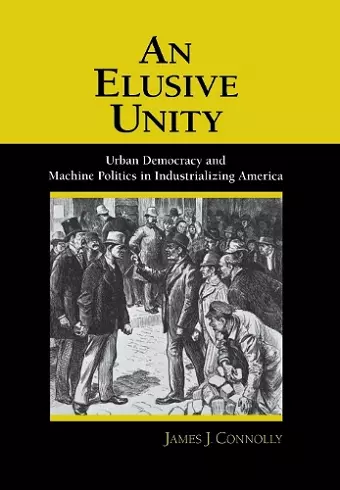An Elusive Unity
Urban Democracy and Machine Politics in Industrializing America
Format:Hardback
Publisher:Cornell University Press
Published:23rd Sep '10
Currently unavailable, and unfortunately no date known when it will be back

Although many observers have assumed that pluralism prevailed in American political life from the start, inherited ideals of civic virtue and moral unity proved stubbornly persistent and influential. The tension between these conceptions of public life was especially evident in the young nation's burgeoning cities. Exploiting a wide range of sources, including novels, cartoons, memoirs, and journalistic accounts, James J. Connolly traces efforts to reconcile democracy and diversity in the industrializing cities of the United States from the antebellum period through the Progressive Era.
The necessity of redesigning civic institutions and practices to suit city life triggered enduring disagreements centered on what came to be called machine politics. Featuring plebian leadership, a sharp masculinity, party discipline, and frank acknowledgment of social differences, this new political formula first arose in eastern cities during the mid-nineteenth century and became a subject of national discussion after the Civil War. During the Gilded Age and Progressive Era, business leaders, workers, and women proposed alternative understandings of how urban democracy might work. Some tried to create venues for deliberation that built common ground among citizens of all classes, faiths, ethnicities, and political persuasions. But accommodating such differences proved difficult, and a vision of politics as the businesslike management of a contentious modern society took precedence. As Connolly makes clear, machine politics offered at best a quasi-democratic way to organize urban public life. Where unity proved elusive, machine politics provided a viable, if imperfect, alternative.
A welcome voice has been added to recent conversations regarding the nature of American democracy across the nineteenth century's transition from a rural world smothered in smug notions of demographic homogeneity to a morass of roiling urban cauldrons confounded by ethnic heterogeneity.... Connolly has demonstrated admirable resolve in his research and analysis, creating a thoughtful set of insights into the elusive concept of pluralistic democracy.
-- Thomas J. Jablonsky * Journal of the Gilded Age and Progressive Era *Connolly has devoted a lifetime to the study of urban political culture in the Gilded Age and Progressive Era. In the current work, he examines the cultural meanings given for the existence of urban bosses and political machines from their rise in the Civil War US to the 1950s.... The topic is a complex one, and Connolly manages it in chapters focused on specific groups, such as good government reformers, settlement house reformers, journalists, and machine apologists.... Intellectually stimulating [and]... highly recommended.
* Choice *Connolly reminds us in this thoughtful reconsideration of machine politics [that] Americans' chronic disaffection with American politics and government reflects both a lingering romantic reverence for republican ideals and a determination to nurture a more open, inclusive political order.
-- Roger Biles * Indiana Magazine of History *This book covers the hunt for a moral consensus well, and its appreciation for how the city bosses adapted their image in the 1890s and how far social scientists besotted with pluralist theory bought into it as the reality is a discernment long overdue.... The thoughtful conclusion Connolly comes to would apply to civic movements in general, and most likely to machines in places ungraced by such misread and meritorious novels as The Last Hurrah. Scholars of boss politics or urbna reform should not let Connolly's book elude them.
-- Mark Wahlgren Summers * American Historical ReviISBN: 9780801441912
Dimensions: 235mm x 155mm x 24mm
Weight: 907g
280 pages